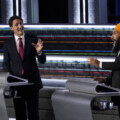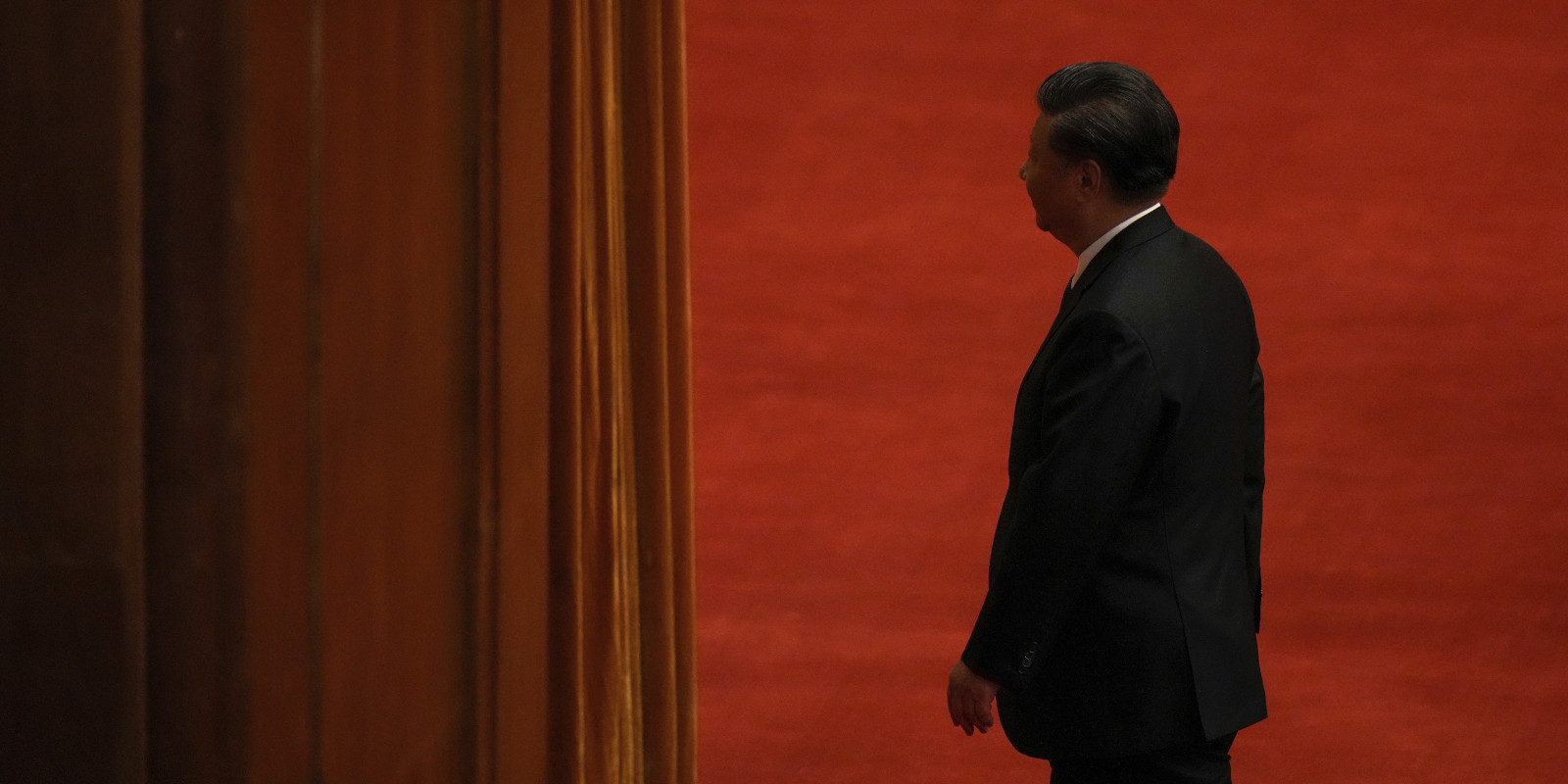In this Hub Dialogue, The Hub’s editor-at-large Sean Speer speaks to Jacob Helberg, who led Google’s efforts against disinformation and foreign interference and is the author of the new book, The Wires of War: Technology and the Global Struggle for Power.
This conversation has been revised and edited for length and clarity.
Sean Speer
Today’s Hub Dialogue is with Jacob Helberg who is a senior adviser at the Stanford University Center on Geopolitics and Technology and an adjunct fellow at the Center for Strategic and International Studies.
Previously Jacob led Google’s global policy efforts to combat disinformation and foreign interference.
He’s the author of the new book, The Wires of War: Technology and the Global Struggle for Power, which has been described as a “wake-up call” to the rise of “techno-totalitarian regimes” and what it means for the future of technology and geopolitics.
I am grateful to be joined by Jacob for a conversation about his fascinating book.
Jacob Helberg
Thanks for having me, Sean.
Sean Speer
You use the language of the Cold War to describe the growing U.S.-China technological and geopolitical rivalry. How does this tech-fueled war, as you describe it, differ from the first Cold War? Are there any limits to understanding these issues through a conventional Cold War paradigm?
Jacob Helberg
The question, it seems to me, today isn’t so much whether we’re really living through the Cold War, but whether we’re living through a Cold War. War and peace have never really been binary. It’s always been a spectrum. Cold wars throughout history are actually fairly normal. If you go back and look at the original definition of the term, George Orwell defined it as a “peace that is no peace,” and 600 years before that Spanish scholar Don Juan Manuel articulated the idea of temperate or simmering below the thin surface of peace. I would argue then that we’re living through a new Cold War that looks very different from the last one because technology has changed.
Today, governments can leverage dual-use technologies with both commercial and strategic applications to overcome what can be thought of as a destructiveness-usability paradox, which is an inverse relationship between the degree of destructiveness of a technology and its rational usability as an instrument of political warfare.
The best way to understand this is this: If you take high-yield nuclear weapons, they’re instruments of indiscriminate mass destruction, and they can be there for us to deter war, but they’re very impractical for fighting an adversary in a rational way. Commercial civilian dual-use technologies are the inverse. Technologies such as 5G and fibre optic cables are both increasingly high impact and highly usable. Because weaponizing these technologies rarely involves any direct physical destruction or loss of life, it gives governments the strategic benefit of conflict without the cost repercussions.
Sean Speer
The book outlines the inherent limits to what you describe as a “one company, two systems” model that tech firms have adopted to try to navigate this growing Cold War. Can you just explain what you mean by one company, two systems, and why you think it’s ultimately unsustainable?
Jacob Helberg
I saw, when I worked at Google, that a lot of tech companies that are used to operating on a global scale were complying with legal systems that are fundamental at odds. The laws of a country are an expression of the values that undergird a political system. And what we’re seeing is that in the U.S. and China, you have values that are fundamentally contradictory.
I’m not talking about cultural values. I’m talking about political ones, so, for instance, values with respect to expectations on free speech. In the U.S., we have a system where we expect to have free speech, protection of intellectual property, protection of civil liberties and personal privacy. In China, you have a system where the exercise of these core rights is the sole source of authority and political legitimacy of the Chinese Communist Party, and the system relies on the assumption that companies need to hand over a lot of rights that are normally protected in western countries.
Think of free speech for instance. China has a lot of rules on speech censorship, and companies are expected to hand over a lot of the information of the personal information of users. They’re expected to hand over a lot of commercial information sometimes and keep that compliance confidential.
The result is that global companies are increasingly being asked to comply with two systems that are completely incompatible. If the Chinese government asks you to hand over personal information, while at the same time in France, you have an expectation of respecting personal privacy. As a company, do you go public with it? Do you just comply quietly? It’s a really hard, tenuous situation, and that’s why it’s becoming increasingly hard for companies to straddle the autocrat world and the democratic world in the digital sphere.
Sean Speer
In light of these trends (as well as of course the pandemic experience), the books talk about the prospect of countries focusing more on building domestic capacities in certain sectors and technologies. Yet there’s been a tendency in some circles to be dismissive or critical of these efforts. They’re treated as statists, protectionists, and so on. Based on your experience and expertise, do you think Western governments should be pursuing industrial policies in certain areas? How do we determine which sectors or technologies ought to be viewed as strategic?
Jacob Helberg
It’s really important. I would answer that question in a few different parts. The first is at the level of ideas. It’s important for us to be willing to revisit a lot of the assumptions that have been calcified in our foreign policy apparatus. For a long time, the idea was as China brought over Starbucks and McDonald’s, and other expressions of Western capitalism, its middle class would eventually want political freedom, and that human rights issues would be addressed from the ground up. That assumption was totally wrong.
Another discredited assumption that has undergirded a lot of our recent economic and trade policy is manufacturing jobs aren’t coming back. The prevailing view in policy circles is that not only are these jobs never coming back, but that it’s not even worth trying to compete for manufacturing jobs because they’re gone, they’re the past, and that we now live in a knowledge economy.
Now, I think that it’s really a healthy thing to stress test a lot of these really big assumptions we’ve made over the years, because when we’re wrong, it’s incredibly costly for the country and for everyday democratic society. Take the manufacturing one again. It’s important to remember that as recently as 2000, the iPhone was manufactured in Elk Grove, California, so this isn’t ancient history.
People sometimes say that we can’t have manufacturing jobs because automation is already replacing all the manufacturing jobs. As I wrote in the book, I think the hype of automation is sometimes a little bit overblown. We have yet to manufacture garments in a fully automated way, let alone more complex systems like iPhones. China currently has 133 million workers in its manufacturing sector, so there’s a lot of manual manufacturing jobs out there. They’re just not in the U.S., and a lot of them aren’t in Canada. So, it’s a really healthy thing for us to double click on that assumption and ask, “Why can’t we make things in the U.S. anymore? And why haven’t we made things? Why have the jobs offshored? Is it just that the cost of labor is low? Or is it also that our Chinese competitors have been providing a lot of unfair subsidies and have been engaging in IP theft, which has allowed them to avoid having to invest a lot of money in R&D?” That’s a really important debate to have.
The other point that I was going to make is on decoupling; it’s already a reality. It’s not even so much a debate. We can have the debate about whether or not to decouple in the U.S., but China is racing to decouple. Xi Jinping has already been promoting his whole concept of dual circulation for the Chinese economy, which is basically a new term to refer to an old concept of autarky. He wants to make things in China and consume things in China, and he wants China to be as autarkic as possible. We have to ask ourselves, therefore: if decoupling involves a race to develop domestic capacities, do we want to be in a situation where two years from now, China is no longer reliant on us when we are still reliant on them? That will be a very precarious position for us to be in.
During the coronavirus pandemic, China was using its control of the world’s supply chain to basically make discretionary decisions about how to allocate and distribute ventilators, masks and hand sanitizers. That was a really uncomfortable position for a lot of democracies to be in. And so, I think it’s important that even if it’s going to be really costly, and even if there might be some short-term pain, it’s vitally important for the democratic world to think about ways of re-industrializing.
Sean Speer
As we’ve been discussing, the book envisions a world where national borders are going to matter more and in which western companies are going to have to make tough choices. Yet it’s not lost on me that many of these big, global companies are overwhelmingly staffed through a process of self-selection by people who have a global orientation – or what British writer David Goodhart might call a collection of “anywheres.” Do these people and their companies have sufficient self-awareness to make the choices that you’re saying will be imperative if we’re going to ultimately win this geopolitical and technological race?
Jacob Helberg
I think you’re putting your finger on a really important issue, which is the way that I’ve seen this debate play out in Silicon Valley, in the form of a bit of an identity crisis among a lot of companies that wrestle with the question of whether or not to consider themselves an American company versus a global company. As Kai-Fu Lee once pointed out, sometimes Silicon Valley companies have a bit of a tendency to see the world in terms of users instead of citizens. I think that’s really important, because you’ve seen that translate to big executive decisions. For example, Microsoft proclaimed itself to be a neutral digital Switzerland, encouraged other companies to do the same, and started launching their own foreign policy initiatives where they wanted a digital Geneva Convention. Google decided to turn down Project Maven, even if they have since tried to course-correct. But this is the question of whether or not they self-identify as an American company or a global company is a really important one.
I think back to other big, critical turning points in history like World War Two. Imagine if General Motors told the U.S. government on the eve of World War Two, “Sorry, building weapons is against our ethical principles” Or “it isn’t really our place to pick sides.” It would have been unthinkable. Instead, GM embraced the slogan, “Victory is our business.”
People are so queasy nowadays about patriotism, and I think that there’s an important distinction to be drawn between nationalism and patriotism. I think people should be comfortable with the idea that it’s healthy to like their country and the values that their country stands for. That doesn’t necessarily make you nationalistic. It doesn’t mean that you think that your country is superior to others. It simply means that you have an affinity for your country, and you believe in the values that it represents.
I think that it’s wrong when companies tend to lose sight of the fact that the reason that we have an open and free internet today isn’t a coincidence. It’s because the U.S. government and its allies have proactively promoted an international environment where it’s been very conducive to having an open and free internet. We have protections of intellectual property because we have a global system that has been pushed by the U.S. government and allies to have a lot of these legal concepts in place. But the natural state of the world is not orderly or rules-based. The world doesn’t organize itself.
So, when companies succeed on the backs of an open and free internet, in this incredibly peaceful system that we’ve had, while at the same time, express reluctance to recognize or appreciate this system, or to support the foreign policy professionals who are tasked with actually running it, it creates a bit of a dichotomy. I don’t think it’s malevolence. I think it’s just political naivete from a lot of people in the tech industry. But I’m encouraged by the fact that I do think that philosophy has been changing because people now are becoming more aware and catching up to the fact that it actually is very important to support the mission of the U.S. government, in a world where democracy has been on the decline internationally, and is being contested by foreign great powers like Russia and China.
Sean Speer
I’ve heard you talk elsewhere about what you describe as a “combustible international environment.” Put yourselves in the shoes of Canadian policymakers: Canada is a middle power dependent on trade and it’s increasingly stuck in the middle of Cold War between the U.S., its major trading partner, and China, which happens to be its second largest trading partner. How should Canadian policymakers navigate this increasingly combustible international environment? What advice would you have for a middle power country like Canada?
Jacob Helberg
Well, the advice I have is this: In the closing chapters of the book, I quote a speech by Winston Churchill, where he described how you often see dictators making incredibly strong statements, acting incredibly tough, and hiding behind brigades, tanks, and missiles, but yet, they are terrified of the smallest clench of thought and words, and they do everything to extinguish individual ideas. I think that with China, you’re seeing that in full technicolor in how aggressively they pursue dissidents, whether it’s in the tech industry or online. I think that at the end of the day, it’s really important for democracies to realize that China is a really big country and has 1.4 billion people, but we have the power of ideas and the democratic world is a very big part of the world, both economically as well as in terms of population.
What I would say then is to approach this problem from a place of confidence, because I think that too often, in foreign policy circles, it’s become very fashionable to be a little bit down on democracies, or, at least, democracy’s ability to come out on the other side of this political struggle victoriously.
Similarly it’s important to have a concerted effort between allies. After all, that’s how the Cold War was won. The U.S., Canada and others ought to be working together on various things like reindustrializing like we discussed earlier.
It’s also really important to be willing and have the courage to acknowledge and embrace the simple truth. There’s an enormous amount of reluctance to call this a Cold War, or as I call it, a grey war. I think that just being honest about what it is is really important, because, if you say that it’s a competition, countries can afford to lose a competition. Competitions assume that you’re competing on a level-playing field, like tennis, and if you lose, it’s not that big of a deal. We’re talking about the survival of democracy, and the survival of the future livelihood of everyone that lives in a democracy. The NBA knows that when it’s being silenced. Marriott knows that when it’s forced to fire an employee for simply liking social media posts. A lot of workers know that when they see their factories in Canada or the U.S. closed down by the thousands.
It’s vitally important to call it what it is because unless you are willing to call it a war, you’re not going to be willing to absorb the short-term costs. This matters when it comes to prioritizing what needs to be done. When you’re in a war, all your other priorities are rerouted and reprioritized to serve a single goal, which is winning a geopolitical contest. I think that confidence as well as willpower are what’s needed to win. We have to remember that we have agency and ultimately we’re very suited to do everything we can do.
Sean Speer
Well, Jacob, it’s a powerful message that I hope a lot of people ultimately hear. The book is The Wires of War: Technology and the Global Struggle for Power. Thanks so much for joining us for today’s dialogue.
Jacob Helberg
Thanks for having me.
Recommended for You

The Weekly Wrap: Reject racialism. Embrace meritocracy

The Week in Polling: Liberals and NDP tied for first time since 2015, Canadians twice as likely to feel worse off financially than better, and most Ukrainians want the war to end as soon as possible

Stephen Staley: Escaping the media echosystem

Need to Know: Two cheers and one boo for globalization



